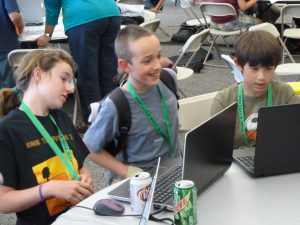Poster in /r/confession expressing deep suicidal feelings; please help
This self-post was originally posted to /r/SuicideWatch. See more things from Dan's Reddit account.
Dan Q
This self-post was originally posted to /r/SuicideWatch. See more things from Dan's Reddit account.
This link was originally posted to /r/Cows. See more things from Dan's Reddit account.
The original link was: http://i.imgur.com/RhIsQpn.jpg
The BBC ran a story this week about changes to the National Curriculum that’ll introduce the concepts of computing programming to children at Key Stage 1: that is, between the ages of five and seven. I for one think that this is a very important change, long overdue in our schools. But I don’t feel that way because I think there’ll be a huge market for computer programmers in 13+ years, when these children leave school: rather, I think that learning these programming skills provide – as a secondary benefit – an understanding of technology that kids today lack.

Last year, teacher and geek Marc Scott wrote an excellent blog post entitled Kids Can’t Use Computers… And This Is Why It Should Worry You. In it, he spoke of an argument with a colleague who subscribed to the popular belief that children who use computers are more technically-literate than computer-literate adults. Marc refutes this, retorting that while children today make use of computers more than most adults (and far more than was typical during the childhood of today’s adults), they typically know far less about what Marc calls “how to use a computer”. His article is well worth reading: if you don’t have the time you should make the time, and if you can’t do that then here’s the bottom line: competency with Facebook, YouTube, Minecraft, and even Microsoft Office does not in itself demonstrate an understanding of “how to use a computer”. (Marc has since written a follow-up post which is also worth reading.)

An oft-used analogy is that of the automobile. A hundred years ago, very few people owned cars, but those people that did knew a lot about the maintenance and inner workings of their cars, but today you can get by knowing very little (I’ve had car-owning friends who wouldn’t know how to change to their spare tyre after a puncture, for example). In future, the requirements will be even less: little Annabel might be allowed to ‘drive’ without ever taking a driving test, albeit in a ‘driverless’ computerised car. A similar thing happened with computers: when I was young, few homes had a computer, but in those that did one or more members of the family invariably knew a lot about setting up, configuring, maintaining, and often programming it. Nowadays, most of the everyday tasks that most people do with a computer (Facebook, YouTube, Minecraft, Microsoft Office etc.) don’t need that level of knowledge. But I still think it’s important.

Why? Because understanding computers remains fundamental to getting the most out of them. Many of us now carry powerful general-purpose computers in our pockets (disguised as single-purpose devices like phones) and most of us have access to extremely powerful general-purpose computers in the form of laptops and desktops (but only a handful of us use them in a ‘general purpose’ way; for many people, they’re nothing more than a web browser and a word processor). However, we expect people to be able to understand the issues when we ask them – via their elected officials – to make sweeping decisions that affect all of us: decisions about the censorship of the ‘net (should we do it, and to what extent, and can we expect it to work?) or about the automation of our jobs (is it possible, is it desirable, and what role will that mean for humans?). We expect people to know how to protect themselves from threats like malicious hackers and viruses and online scams, but we give them only a modicum of support (“be careful, and install anti-virus software”), knowing full well that most people don’t have the foundation of understanding to follow that instruction. And increasingly, we expect people to trust that software will work in the way that it’s instructed to without being able to observe any feedback. Unlike your car, where you may know that it’s not working when it doesn’t go (or, alarmingly, doesn’t stop) – how is the average person to know whether their firewall is working? You can find out how fast your car can go by pressing the pedals, but how are you to know what your computer is capable of without a deeper understanding than is commonplace?

A new generation of children tought to think in terms of how computers and their programs actually work – even if they don’t go on to write programs as an adult – has the potential to usher in innovating new ways to use our technology. Just as learning a foreign language, even if you don’t go on to regularly use it, helps make you better at your native language, as well as smarter in other ways (and personally, I think we should be teaching elementary Esperanto – or better yet, Ido – to primary school children in order to improve their linguistic skills generally), learning the fundamentals of programming will give children a far greater awareness about computers in general. They’ll be better-able to understand how they work, and thus why they sometimes don’t do what you expect, and better-equipped to solve problems when they see them. They’ll have the comprehension to explain what they want their computer to be able to do, and to come up with new ideas for ways in which general-purpose computers can be used. And, I’ve no doubt, they’ll be better at expressing logical concepts in mutually-intelligble ways, which improves human communication on the whole.
Let’s teach our kids to be able to understand computers, not just “use” them.